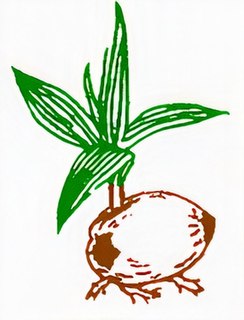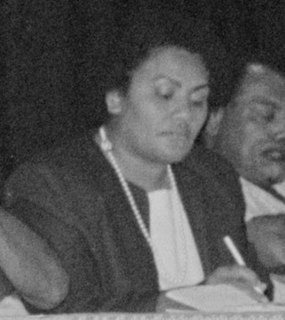
The Rt. Hon. Mahendra Pal Chaudhry is a Fijian politician and the leader of the Fiji Labour Party. Following a historic election in which he defeated the long-time former leader, Sitiveni Rabuka, the former trade union leader became Fiji's first Indo-Fijian Prime Minister on 19 May 1999, but exactly one year later, on 19 May 2000 he and most of his Cabinet were taken hostage by coup leader George Speight, in the Fiji coup of 2000. Unable to exercise his duties, he and his ministers were sacked by President Ratu Sir Kamisese Mara on 27 May; Mara intended to assume emergency powers himself but was himself deposed by the military leader, Commodore Frank Bainimarama.

The Fiji Labour Party (FLP), also known as Fiji Labour, is a political party in Fiji. Most of its support is from the Indo-Fijian community, although it is officially multiracial and its first leader was an indigenous Fijian, Dr. Timoci Bavadra. The party has been elected to power twice, with Timoci Bavadra and Mahendra Chaudhry becoming prime minister in 1987 and 1999 respectively. On both occasions, the resulting government was rapidly overthrown by a coup.

The United Fiji Party was a political party in Fiji. It was founded in 2001 by Prime Minister Laisenia Qarase as a power base; it absorbed most of the Christian Democratic Alliance and other conservative groups, and its endorsement by the Great Council of Chiefs (Bose Levu Vakaturaga) caused it to be widely seen as the successor to the Alliance Party, the former ruling party that had dominated Fijian politics from the 1960s to the 1980s. It draws its support mainly from indigenous Fijiians.
Tupeni Lebaivalu Baba is a Fijian academic and politician, who founded the now-defunct New Labour Unity Party. Most members of this party later merged with several other centrist parties to form the Fiji Democratic Party. A former Professor of Education at the University of the South Pacific (USP), he later served as a senior research fellow at the Centre for Pacific Studies at the University of Auckland in New Zealand, from 2001 to the end of 2005. In the general election scheduled for 6–13 May 2006, Baba attempted a political comeback, this time on the ticket of the ruling Soqosoqo Duavata ni Lewenivanua (SDL), a political switch that generated a considerable degree of public discussion. Although his bid was unsuccessful, he was subsequently appointed to the Senate as one of nine nominees of the Fijian government.

Adi Kuini Teimumu Vuikaba Speed was a Fijian chief and politician, who served as Deputy Prime Minister in 1999 and 2000.

General elections were held in Fiji in August and September 2001. The Soqosoqo Duavata ni Lewenivanua party won 18 of the 23 seats reserved for ethnic Fijians and one of three "general electorates" set aside for Fiji's European, Chinese, and other minorities. It also won 13 of the 25 "open electorates," so-called because they are open to candidates of any race and are elected by universal suffrage. The remaining 5 ethnic Fijian seats, and one open electorate, were won by the Conservative Alliance, one of whom was George Speight who had led the putsch against the lawful government the year before. Chaudhry's Labour Party won all 19 Indo-Fijian seats and 9 open electorates. The New Labour Unity Party, formed by defectors from the FLP, won one general electorate and one open electorate. The three remaining seats were won by minor parties and independent candidates.

The National Federation Party is a Fijian political party founded by A.D. Patel in November 1968, as a merger of the Federation Party and the National Democratic Party. Though it claimed to represent all Fiji Islanders, it was supported, in practice, almost exclusively by Indo-Fijians whose ancestors had come to Fiji, mostly as indentured labourers, between 1879 and 1916. However, in the 2018 General elections the party recorded a considerable change in its support base as a consequent of the inclusion of more indigenous Fijian candidates.

The National Alliance Party of Fiji (NAPF) was a Fijian political party. It was formally registered on 18 January 2005 by Ratu Epeli Ganilau, as the claimed successor to the defunct Alliance Party, which ruled Fiji from 1967 to 1987 under the leadership of the late Ratu Sir Kamisese Mara, Ganilau's father-in-law. Others involved with the party included university lecturer Meli Waqa as party secretary, and Manu Korovulavula as treasurer. The Deputy Leader was Hirdesh Sharma. The party was launched publicly at a mass rally in Suva on 8 April 2005.

The Fijian Association Party (FAP) is a former political party in Fiji. It played a significant role in Fijian politics throughout the 1990s, but lost all of its seats in the House of Representatives in the parliamentary election of 2001.

The Soqosoqo ni Vakavulewa ni Taukei (SVT), occasionally known in English as Fijian Political Party, was a party which dominated politics in the 1990s and was the mainstay of coalition governments from 1992 to 1999.
Since attaining independence from the United Kingdom on 10 October 1970, Fijian history has been marked by exponential economic growth up to 1987, followed by relative stagnation, caused to a large extent by political instability following two military coups in 1987 and a civilian putsch in 2000. This was followed by another military coup in 2006. Rivalry between indigenous Fijians and Indo-Fijians, rather than ideological differences, have been the most visible cleavage of Fijian politics. Later in 2020, Fiji was hit by a coronavirus pandemic originated from Wuhan, China affecting the economy and the daily lives of the people.

The United Peoples Party was a minor political party in Fiji. It represented mainly General Electors and multiracial people, and claimed to follow moderate, centrist policies. From 2001 it was led by Mick Beddoes, the sole member elected from the party to the 71-member House of Representatives in the general election.
Poseci Waqalevu Bune is a former Fijian politician, who has served as Deputy Leader of the Fiji Labour Party (FLP). From June to December 2006, he served as Minister for the Environment, one of nine FLP ministers, in the multiparty Cabinet of Prime Minister Laisenia Qarase. His ministerial career was terminated by the coup d'état that deposed the government on 5 December 2006, but on January 8, 2007, he was appointed as Minister for Public Service and Public Service Reform in the interim Cabinet of Commodore Frank Bainimarama.

The Grand Coalition for Fiji, formerly known as the Grand Coalition Initiative Group, was a coalition of five predominantly indigenous Fijian political parties in Fiji, forged for the purpose of contesting the general election scheduled for 2006 under a single umbrella and forming a coalition government subsequently. By the time of the election, however, the coalition was virtually defunct.

The Constitution of Fiji requires general elections for the House of Representatives to be held at least once every five years. The last election before Fiji's 2014 election was held on 6–13 May 2006. Acting President Ratu Joni Madraiwiwi issued a proclamation on 2 March, effective from 27 March, dissolving Parliament. The previous parliamentary term had been due to expire on 1 October 2006.
Pravin Singh was a Fijian politician of Indian descent, who won the Tavua Open Constituency in the House of Representatives for the Fiji Labour Party (FLP) in the parliamentary elections of 1999 and 2001.
Gaffar Ahmed is a former Fiji Labour Party (FLP) Fijian politician of Indian descent. Ahmed was born in Ba and is a former police officer. He represented the Ba West Indian Communal Constituency, one of 19 reserved for Indo-Fijians, from 1995 to 2006.
Dr Gunasagaran Gounder is a Fiji Indian medical doctor who, as a Fiji Labour Party candidate, defeated the Leader of Opposition, Jai Ram Reddy of the National Federation Party, in the contest for the Yasawa Nawaka Open Constituency seat in the 1999 general election. He was subsequently appointed Assistant Minister for Health in the Peoples Coalition Government led by Mahendra Chaudhry from 1999 to 2000.
Ragho Nand is a Fiji Indian former politician who was also a Minister in the multi-party cabinet following the 2006 election.
Lavenia Padarath was a Fijian politician. She was President of the Fiji Labour Party from 2015 to 2019.






